|
Perspectives on proposed changes to Brazil’s Forest Code |
Over the past twenty years Brazil emerged as an agricultural superpower: today it is the largest exporter beef, sugar, coffee, and orange juice, and the second largest producer of soybeans.
While much of this growth has been fueled by a sharp increase in productivity resulting from improved breeding stock and technological innovation, Brazil has benefited from large expanses of available land in the Amazon and the cerrado, a grassland ecosystem. But agricultural growth in Brazil has always been limited — at least on paper — by its environmental laws. Under the country’s Forest Code, landowners in the Amazon must keep 80 percent of their land forested. In the cerrado, the proportion is 20-35 percent.
The provisions of the Forest Code make Brazil’s environmental laws some of the most stringent in the world, but in practice they are haphazardly enforced and often used as a tool for extracting bribes from farmers and ranchers, rather than protecting the environment. As such, it is estimated that less than 10 percent of landowners in the Amazon are compliant with the regulation.
Given widespread “illegality” in the farm sector, there is strong interest in “regularizing” the Forest Code. Leading the push has been an alliance of large-scale farmers and ranchers, which is hoping to reduce forest reserve requirements, stipulations for reforestation, and restrictions against clearing forest along waterways and on hillsides.
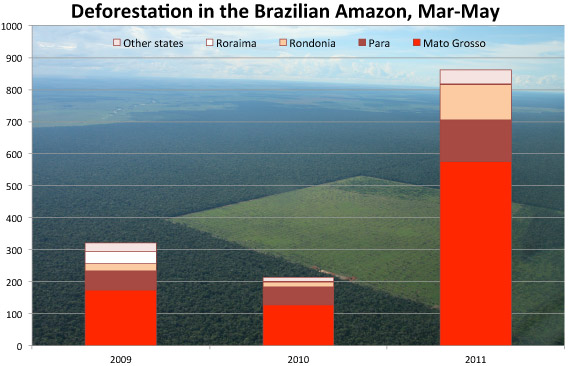
But the effort to reform the Forest Code is controversial. Citing Brazil’s progress in reducing its annual deforestation by more than 75 percent since 2004, environmentalists generally oppose the proposed changes. Some greens fear the new code would effectively grant “amnesty” for illegal deforesters and signal that further transgressions may be forgiven in the future, potentially reversing Brazil’s progress in arresting deforestation. Recent data released by Brazilian NGOs and the government seems to support these concerns, revealing a sharp increase in deforestation and degradation in key agricultural states. Two-thirds of clearing in recent months occurred on private lands, which are most likely to benefit from changes in the Forest Code.
Agroindustrial interests in Brazil maintain that modernization of the 1965 law is critical to encouraging investment in the farm sector and providing more food to feed the world. They note that farmers and ranchers in places in the United States and Europe face no legal reserve requirement.
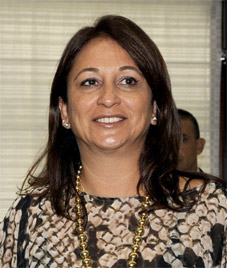 Senator Abreu |
Among the biggest supporters of the Forest Code reform bill is Senator Katia Abreu, a member of opposition Democrat Party who heads the Brazilian Agricultural Confederation (CNA).
Abreu, herself a large landowner in the state of Tocantins, told mongabay.com during a June 2011 interview that reform of the Forest Code is essential to ensuring Brazil’s economic growth, while safeguarding environmental services provided by the Amazon rainforest.
“To become a global agricultural powerhouse, Brazil needs modern environmental legislation, which combines agricultural production and environmental conservation, providing a legal certainty for farmers, who depend on a balanced environment to continue production,” she said.
“The Brazilian Forest Code is a law from 1965, modified by a series of government actions, which no longer reflects the reality of national agriculture. If not updated, will continue criminalizing 90% of farmers in the country.”
Abreu claims modernization of the Forest Code “will not diminish the rules of protection.”
Instead, the rules will “become clearer.”
Abreu maintains the product of reform will be a “preserved” Amazon: “In 2030, the Amazon will be is as it stands today, preserved.”
INTERVIEW WITH THE PRESIDENT OF THE CONFEDERATION OF AGRICULTURE AND LIVESTOCK OF BRAZIL (CNA), SENATOR KATIA ABREU
Mongabay: What inspired you to enter politics?
Senator Katia Abreu: I became involved in politics in order to find solutions for farmers and people in the rural areas of my state, Tocantins, in Brazil. I first began by serving as president of the Rural Union City Gurupi, located in a farming region which had a very weak infrastructure. I identified the challenges the area faced and sought the most efficient solutions for them. Following this work, I chaired for four consecutive terms in the Federation of Agriculture and Livestock of Tocantins. The defense of rural activity continued to be my focus, when, at that time, I was elected as representative in House.
Between 2000 and 2001, I chaired the so-called “caucus” – a group of representatives in the House who defends the interests of farmers. I worked hard for the Brazilian countryside and my state. In 2002, I returned to the House as the most voted representative of Tocantins, with 76,000 votes (13% of the votes in the state). In 2005 I was elected Vice Chairman of the Confederation of Agriculture and Livestock in Brazil (CNA), when I deepened my knowledge and established a working strategy to ensure optimal conditions of production for the agricultural sector. In 2006, I became a Tocantins Senator. I chaired the CNA in 2008, when I was able to work on actions in defense of a sector that generates one third of Brazilian GDP, 42% of exports and one third of the jobs in the country.
Mongabay: In your opinion, why has Brazil become an agricultural superpower? What is stopping Brazil from becoming an even bigger agricultural giant?
Senator Katia Abreu: Producing grains and meats is one of Brazil’s strengths, which is in a position to meet the growing domestic and foreign demand for food, without compromising the preservation of 61% of the country’s 851 million hectares which are still covered by native vegetation. Brazil is very efficient in the farming sector. The productivity of agriculture increased by 151% between 1976 and 2011, while the area planted increased by only 31% in the same period. However, the growth of the sector is being stalled because of the legal uncertainty of labor laws, environmental and health regulations and the lack of agricultural policy updates. In order that the country becomes a global agricultural powerhouse, we must prioritize improvements to our inadequate infrastructure, as it is the main obstacle to agricultural production and reduces the competitiveness of Brazilian products in foreign markets.
Mongabay: Why do you think that the reform of the Forestry Code is required? In your opinion, what are the most important changes?
Senator Katia Abreu: The Brazilian Forest Code is a law from 1965, modified by a series of government actions, which no longer reflects the reality of national agriculture. If not updated, will continue criminalizing 90% of farmers in the country. To become a global agricultural powerhouse, Brazil needs modern environmental legislation, which combines agricultural production and environmental conservation, providing a legal certainty for farmers, who depend on a balanced environment to continue production. The new legal framework – approved in the House of Representatives (410 votes in favor and 63 against) and now goes to the Senate – is to balance these two issues, while imposing in Brazil strict environmental laws, including the requirement of preserving 20% to 80% of areas with native vegetation (mostly forest) as a legal reserve within private property, a demand that exists nowhere else on the planet.
The main points of the new Forest Code are the settlement of properties and the rescue of environmental liabilities, correcting oversights which occurred during the occupation of production areas, because it will allow the settlement of farmers in the country and the consolidation of areas which were cleared before July 2008.
Mongabay: Do you believe that the Amazon rain forest helps or hurts farmers in terms of services, such as generating rain?
Senator Katia Abreu: The environmental balance and water supply depend on the preservation of the Amazon rain forest, which further reinforces the importance of the work of farmers in sustainable forest management. This condition has been secured so far and is guaranteed within the new Forest Code, which maintains 80% of an area to be preserved as a legal reserve, within the farms in the Amazon. The figures show that the Amazon biome is the best preserved (86%) among the six biomes. The Amazon forest is not threatened by the new Forest Code. Instead, it will be better protected.
Mongabay: Do you think that Brazil should maintain its national goal of reducing emissions?
Senator Katia Abreu: The targets for reducing emissions of greenhouse gas (GHG) emissions must be maintained. And Brazilian farmers can effectively contribute to this goal. Last June, CNA launched the Climate Governance Program for Low Carbon Farming (PABCO), in order to measure emissions and to find ways for rural activity to be more efficient and emit less carbon. The Agricultural Program Low Carbon Project complements the actions of biomes, CNA developed in partnership with Embrapa (Brazilian Agricultural Research Corporation) with the aim of developing technologies that combine food production with environmental conservation in the six biomes (Atlantic Forest, Cerrado, Amazon, Caatinga, Pantanal and Pampas). With the implementation of PABCO, CNA will make an assessment of the real contribution of the agricultural sector in the emission of greenhouse gases, improving processes and encouraging farmers to adopt sustainable solutions for their business.
Mongabay: Do you have a vision of the Amazon in 2030? Will it have half forest, half agriculture? Anything else?
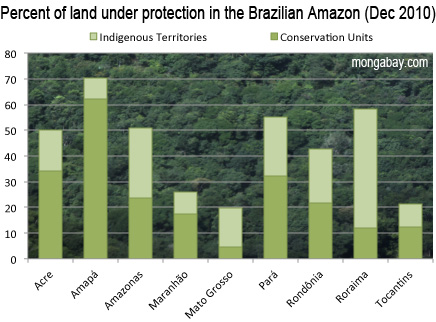 Percent of land under protection in the Brazilian Amazon as of December 2010 |
Senator Katia Abreu: In 2030, the Amazon will be is as it stands today, preserved. The data show that 79.7% of the Brazilian Amazon (334 million hectares of forest) is preserved in various ways (environmental conservation units, indigenous lands, national parks, among others) [Editor’s note: mongabay has been unable to substantiate this claim, which is not consistent with published research]. Only 20.3% of the Amazon is occupied by private areas where food crops and livestock is allowed. And even in these areas, the Brazilian environmental legislation establishes that a substantial portion also be preserved in the form of Legal Reserve and Permanent Preservation Areas (PPAs). The modernization of the Forest Code will not diminish the rules of protection. Instead, they all become clearer.
Mongabay: Are you concerned of the potential risks that the exports of agricultural products from Brazil will be associated with forest clearing?
Senator Katia Abreu: Exports may be hampered by the vagueness of the current environmental legislation, which is so complex and difficult to be interpreted by the people, by the law enforcers, and by the countries that import agricultural products produced in Brazil. Without understanding the 53 articles of the current environmental legislation, many of which have increased or changed over the last decades by means of provisional measures (acts of the Federal Government) and presidential decrees have not been discussed within Congress or by society, importers may restrict imports of Brazilian agricultural products. In fact, the new Forest Code makes Brazilian environmental rules clearer, does not allow new logging and contributes to maintaining the flow of exports.
Mongabay: What do you think of groups like Greenpeace and Friends of the Earth Brazil – the Brazilian Amazon (Friends of the Earth – Brazilian Amazon)?
Senator Katia Abreu: Many NGOs have developed important work, collaborating on solutions for the country, which does not prevent us from doing a general analysis of these groups. There are, however, international NGOs acting in a predatory manner, especially in the discussion of environmental issues. On the eve of the recent vote of the Forest Code, some of them came to threaten us with an international campaign to boycott Brazilian agriculture exports if the new legislation passed. In other words, there are those who work for environmental preservation, and there are those representing interests other than those of Brazilian society.
Mongabay: In recent speeches in the Senate, you have argued that prices of agricultural products must be kept low, which seems to affect farmers. Could you explain your position on this issue?
Senator Katia Abreu: I have called attention in my speeches to the negative effects of maintaining the current Brazilian Forestry Code, as the reduction of planted areas and food production in the country. If environmental legislation is not updated, the many agricultural activities can be reduced to about 20 million hectares because farmers will be forced to uproot their crops and pastures in order to restore the areas of legal reserve and permanent preservation areas without any criteria or technical sense. The Brazilian population, which consumes 70% of national production of grains and meat, will be the big losers, because food prices will rise.
Without updating the code, international buyers will also have to pay more, because Brazil will produce less. It would be inhumane for the poor to eat less. Therefore, it’s not a matter of keeping prices low for producers, but for our end customers, people who buy the food we produce here in Brazil or in countries to which we export. And that can not be, because in fact it does not go against the interests of producers. The positive results of our activities depend on prices, obviously, but they also depend on important factors such as agricultural policy , efficient logistics and legal certainty.
Mongabay: The CNA represents all farmers in Brazil and often refers to them as “food producers.” What is your relationship with the producers of ethanol, pulp and paper, cotton, and bio-diesel?
Senator Katia Abreu: CNA represents all farmers in the country, including those producing sugar cane for ethanol, wood for pulp and paper, oil for bio-diesel production and cotton. As president of CNA, my commitment is to take action in order to resolve specific problems that undermine the performance of each segment of agriculture, and also to minimize the barriers that may jeopardize the activities of the sector, such as the present Forest Code.
Mongabay: Do you see any conflict of interest in politics and your position as chairman of the Agriculture and Livestock Confederation of Brazil (CNA)?
Senator Katia Abreu: There are no conflicts of interest because in both cases farmers seek to ensure ideal working conditions. Many times I have used the Senate floor to point out errors in public policies directed to the the countryside and expose prejudices against people living and working on the land.
Mongabay: There has been much talk about increasing productivity based on the recovery of degraded land and generally investing, “best practices”. What is the economic incentive to make it cheaper if fertile land is available through deforestation?
Senator Katia Abreu: With increased agricultural production in Brazil in recent years, there has been a significant increase by 151% in crop yields between 1976 and 2011. During this period, grain production grew 228% and the area planted has grown much less, 31%, which demonstrates the good results of investments made by farmers in new technologies, which have guaranteed the record volume harvests for each crop year. Without the use of technology, we would need to occupy 122.6 million hectares, and not the current 48.9 million acres, in order to have the same output, thus preserving many areas to be cleared to allow the expansion of the volume produced.
Mongabay: In a Senate speech last month, you said you did not believe in the deforestation figures presented by Imazon, an NGO. The following day, the official figures the INPE, showed that in fact, the estimates by Imazon were conservative. Do you believe the official INPE numbers?
Senator Katia Abreu: The numbers of the Detection System in Real Time INPE (National Institute for Space Research) show that deforestation in Brazil is a rapidly shrinking process. In 2004, the total deforestation in the Amazon (Amazon region and parts of neighboring states) reached 27 thousand square kilometers per year. In 2010, it was 6,500 square kilometers. It is expected that these levels will continue to decline, showing that Brazil is committed to the targets set by the 15th United Nations Climate Change Conference (COP 15), Denmark, reduction in 80% of deforestation by the year 2020. It is important to emphasize that we will not support any form of illegal logging.
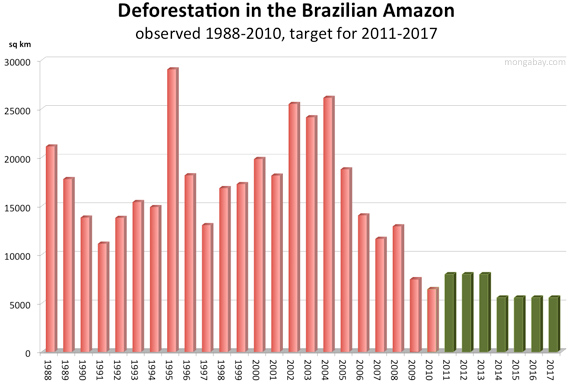
Mongabay: The Forestry Code approved by the Board forgive fines of the past, but does not change the rules of the current code on this issue and does not provide any financial support to producers for them to legalize. So, you think that in 2-3 years further legislation will be required to forgive the probable new illegal practices?
Senator Katia Abreu: Contrary to what has been erroneously reported, none of the articles in the new Forest Code will provide amnesty for those who illegally deforested. It only suspends the fines for those who illegally cut down trees before July 2008. This allows time for farmers to join the Program for the Environment (PRA), pending further assessment of the environmental agency. Only after they fulfill all of the requirements under the PRA, will producers have their fines converted into service provisions, and improvement and restoration of environmental quality. Those who cut down trees after the deadline must accept the consequences, restoring degraded areas and paying fines, among other punishments. Complete amnesty does not offer pure and simple constraints. which is different in the case of the new law, now being considered by the Senate.
As for a new revision of the law in the future, I don’t believe it will be necessary. Once the new Code is approved, the rules will be clear and valid for everyone. Food production will need the rule of law and the environment will be preserved by one of the strictest laws in the world.
|
Perspectives on proposed changes to Brazil’s Forest Code Roberto Smeraldi: Brazilian environmentalist says Forest Code bill will send wrong signal to farmers and ranchers in the Amazon, undermining sustainable use. |
Related articles
Brazilian government: Amazon deforestation rising
(06/30/2011) Satellite data released today by the Brazilian government confirmed a rise in Amazon deforestation over this time last year.
Revised Forest Code may cost Brazil climate commitments
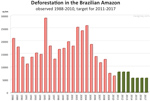
(06/14/2011) The proposed revision of Brazil’s Forest Code could prevent the country from meeting its lower emissions target and is unlikely to ease rural poverty, concludes a new study by the Brazil-based Institute of Applied Economic Research (IPEA).
Could palm oil help save the Amazon?
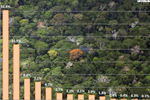
(06/14/2011) For years now, environmentalists have become accustomed to associating palm oil with large-scale destruction of rainforests across Malaysia and Indonesia. Campaigners have linked palm oil-containing products like Girl Scout cookies and soap products to smoldering peatlands and dead orangutans. Now with Brazil announcing plans to dramatically scale-up palm oil production in the Amazon, could the same fate befall Earth’s largest rainforest? With this potential there is a frenzy of activity in the Brazilian palm oil sector. Yet there is a conspicuous lack of hand wringing by environmentalists in the Amazon. The reason: done right, oil palm could emerge as a key component in the effort to save the Amazon rainforest. Responsible production there could even force changes in other parts of the world.
Majority of Brazilians reject changes in Amazon Forest Code
(06/11/2011) The vast majority of Brazilians reject a bill that would weaken Brazil’s Forest Code, according to a new poll commissioned by green groups.
Rash of murders threatens to silence environmental and social activism in Brazil

(06/10/2011) Authorities in Brazil have sent an elite police force consisting of 60 officers to offer protection to environmental activists in the Amazon after a series of killings, reports the Associated Press. The move comes 10 days after Brazil’s Vice President Michel Temer announced the creation of a working group on Amazon violence following the assassinations of three activists in the region in late May. The Brazilian Amazon is no stranger to systemic violence against environmental activists, yet the response from the federal government in the past two weeks is the most significant to date.

(06/03/2011) As an American I know a lot about shame — the U.S. government and American companies have wrought appalling amounts of damage the world over. But as an admirer of Brazil’s recent progress toward an economy that recognizes the contributions of culture and the environment, this week’s decision to move forward on the Belo Monte dam came as a shock. Belo Monte undermines Brazil’s standing as a global leader on the environment. Recent gains in demarcating indigenous lands, reducing deforestation, developing Earth monitoring technologies, and enforcing environmental laws look more tenuous with a project that runs over indigenous rights and the environment.
Assassinations of environmentalists continue in Brazil’s Amazon, deforestation rises
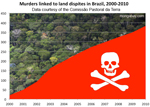
(05/28/2011) A community leader in the Brazilian Amazon was slain Friday just three days after two environmentalists were killed in a neighboring state, reports Reuters. Adelino “Dinho” Ramos, the president of the Movimento Camponeses Corumbiara e da Associação dos Camponeses do Amazonas, a small farmers association, was gunned down front of his family Friday morning in Rondônia. Brazil’s Special Secretariat for Human Rights, an office of the president, said it was unclear who killed Ramos, who had received death threats from loggers.
10 former environment ministers ask Brazil to hold off on Forest Code vote
(05/24/2011) Ten former environment ministers weighed in on Brazil’s looming vote on the forest code governing land use in the Amazon rainforest.